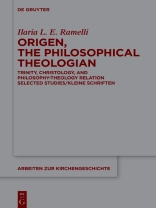How did Origen, one of the major Patristic thinkers, construct his philosophical theology? What are his main innovations in metaphysics, protology, Trinitarian Theology and Christology? How did he view the relation between philosophy and theology? This is a collection of over twenty essays, mostly from world-leading journals and books from outstanding publishers, besides two new ones, from Professor Ilaria L.E. Ramelli’s life-long, and always continuing, research on Origen. This coherent set of studies is grouped around Origen’s metaphysics, protology, Trinitarian theology and Christology, and the relation between theology and philosophy, with reception aspects.
The essays address Origen’s towering figure in Patristic philosophy, Christian Platonism, and the Platonic tradition, facets of his reception of Platonism, reflections concerning the Christianization of Hellenism (vs. the Hellenization of Christianity) and the relation between philosophy and theology and between ‘pagan’ and Christian Platonism; Origen’s philosophical theology and connections to Platonism; the question of Origen’s conversion and his lexicon of epistrophē; a comparison between the imperial Platonist Atticus’ and Origen’s theories on the soul of God the Creator; Alexander of Aphrodisias as a source of Origen’s philosophy and the birth of the eternity formula in reference to the Son; the problem of Origen’s ‘subordinationism’, which must be nuanced; Origen’s major contribution to Trinitarian theology in the notion of hypostasis and its foundation in Scripture and philosophy; the reciprocal indwelling of the Father in the Son and its implications against Origen’s ‘subordinationism’; Origen’s influence on Augustine as paradoxical and a Christological case study; the divine as inaccessible object of knowledge in ancient and Patristic Platonism; the reception of Origen’s ideas in the West; the notion of divine power in Origen: sources and aftermath; Platonist exemplarism in Origen and Plotinus; Paul’s notion of nous in Origen and Evagrius; the reception of Origen in Ps.Dionysius, and Origen’s heritage in the concept of matter in the Dialogue of Adamantius. The volume is rounded off by theoretical reflections on philosophy of religion and philosophical theology.
This book is very relevant to the study of Origen, the foundations of Christian thought, and ancient and late antique philosophy, theology and culture.
Sobre el autor
Ilaria L. E. Ramelli, Stanford, Milan-Rome, Bonn, Cambridge.












